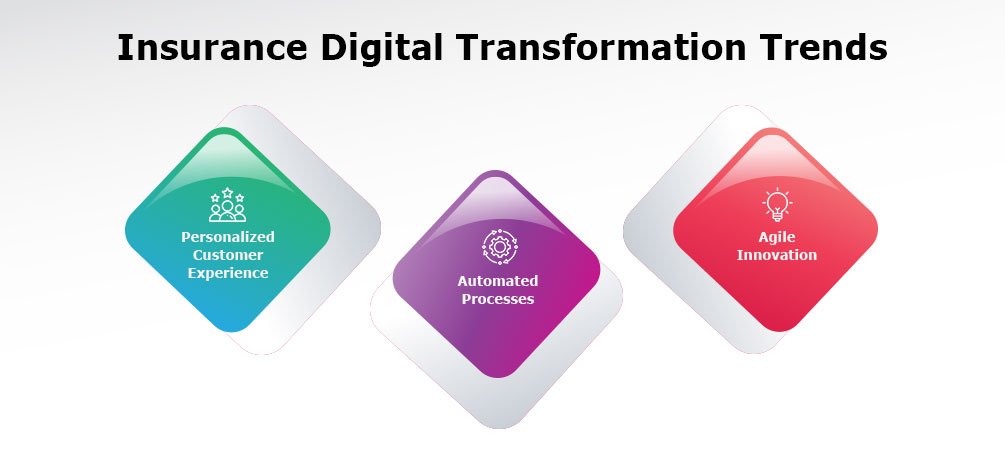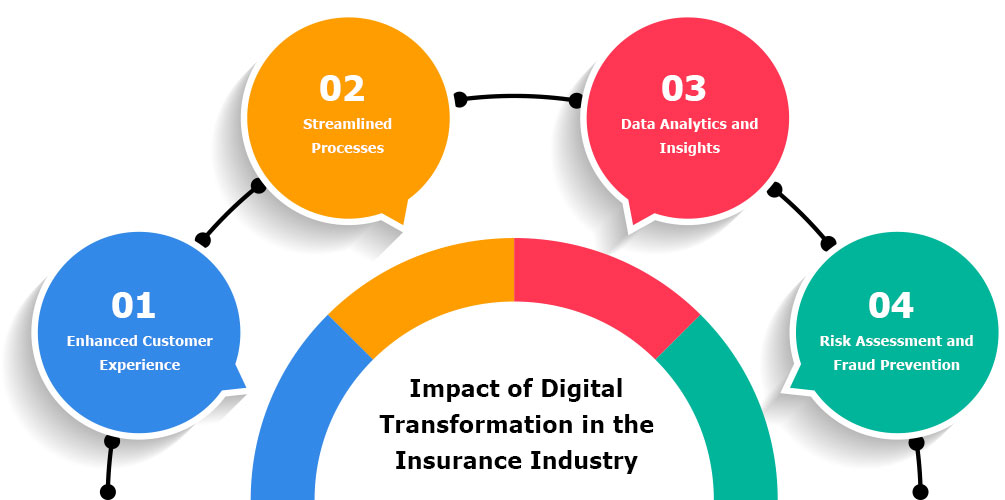Insurance Digital Transformation: From Paper to Pixels
Did you know that the global insurance digital transformation market is projected to reach a staggering $214.16 billion by 2026, growing at a CAGR of 15.7%? This exponential growth highlights the increasing importance of digitalization in the insurance industry, driving innovation, improved customer experiences, and operational efficiencies.
In this blog post, we will delve into the latest insurance digital transformation trends, exploring how this transformative wave is reshaping the insurance landscape and redefining the way insurers cater to their customers’ needs. Let us begin.
What is Insurance Digital Transformation?
In today’s fast-paced digital era, insurance digital transformation has become the buzzword for insurance companies looking to stay ahead of the game. But what exactly does it mean?
Definition: Insurance digital transformation refers to the comprehensive integration of digital technologies and innovative strategies into every aspect of the insurance industry. It involves leveraging advanced technologies, data analytics, automation, and customer-centric approaches to revolutionize traditional insurance processes and improve the overall customer experience.
Importance: Why should insurance companies be concerned about digital transformation? Let’s explore a few compelling reasons:
- Meeting Evolving Customer Expectations: In an increasingly digital world, customers expect seamless interactions, personalized experiences, and instant access to insurance services. By embracing digital transformation, insurance companies can cater to these evolving expectations and provide a customer-centric approach.
- Enhancing Operational Efficiency: Traditional insurance processes often involve manual paperwork, time-consuming tasks, and lengthy approval processes. Through digital transformation, insurance companies can streamline operations, automate repetitive tasks, and improve overall efficiency, resulting in reduced costs and faster turnaround times.
- Staying Competitive in the Digital Age: Insurance digital transformation is not just about keeping up with the latest trends; it’s about survival in a highly competitive market. Companies that fail to adapt to digital advancements risk being left behind by more agile and tech-savvy competitors.
- Unlocking Data-Driven Insights: Digital transformation enables insurance companies to harness the power of data analytics. By leveraging data, insurers can gain valuable insights into customer behavior, risk assessment, fraud detection, and market trends. These insights drive informed decision-making and allow for more accurate pricing, underwriting, and claims management.
- Embracing Innovation and New Opportunities: Digital transformation opens doors to innovation and collaboration with insurtech startups and technology providers. By embracing emerging technologies like AI, blockchain, and IoT, insurance companies can explore new business models, develop innovative products, and tap into previously untapped markets.
In essence, insurance digital transformation is not just a luxury but a necessity in today’s digital landscape.
Insurance Digital Transformation Trends

As insurance companies adapt to the digital age, several exciting trends are shaping the landscape of insurance digital transformation. Let’s explore some of the latest trends that are driving innovation and reshaping the industry:
- Personalized Customer Experience: Insurers are leveraging data analytics and AI to offer tailored insurance solutions to customers. By understanding individual preferences, behavior patterns, and risk profiles, insurance companies can provide personalized coverage options, customized pricing, and proactive policy recommendations.
- Automated Processes: Digital transformation is streamlining traditional insurance processes, reducing manual intervention, and improving operational efficiency. Automated claims processing, underwriting, and policy administration are becoming standard practices, leading to faster turnaround times, reduced errors, and enhanced customer satisfaction.
- Agile Innovation: The adoption of agile methodologies and rapid experimentation is fostering innovation within the insurance industry. Insurers are embracing a test-and-learn approach, leveraging technology to quickly launch new products, explore emerging markets, and adapt to changing customer needs.
Real-world Examples:
Lemonade: This innovative insurance company utilizes AI and machine learning algorithms to offer hassle-free and instant digital insurance policies, transforming the traditional claims process and providing a seamless customer experience.
Progressive: With their Snapshot program, Progressive leverages telematics and data analytics to track driving behavior and offer personalized auto insurance premiums based on individual risk profiles. This approach not only benefits customers with fairer pricing but also enables Progressive to gain valuable insights into risk assessment.
Impact of Digital Transformation on the Insurance Industry

Digital transformation has had a profound impact on the insurance industry, revolutionizing the way insurers operate and the services they provide. Let’s delve into the key areas where digitalization is making a significant difference:
Enhanced Customer Experience:
- Seamless Interactions: Digital channels enable insurers to provide 24/7 accessibility and personalized support, allowing policyholders to manage policies, file claims, and seek assistance at their convenience.
- Self-Service Capabilities: Through user-friendly web portals and mobile apps, customers can easily access policy information, make payments, and track claims, reducing dependence on manual processes and improving overall satisfaction.
Streamlined Processes:
- Automated Claims Processing: By implementing digital tools and AI-powered algorithms, insurance companies can automate claims intake, validation, and settlement, reducing paperwork, accelerating claim resolution, and enhancing efficiency.
- Paperless Documentation: Digital transformation enables insurers to digitize policy documents, contracts, and other paperwork, eliminating the need for physical storage, improving document retrieval, and reducing administrative overhead.
Data Analytics and Insights:
- Informed Decision-making: By harnessing the power of data analytics, insurers gain valuable insights into customer behavior, preferences, and risk patterns. This data-driven approach enables more accurate underwriting, pricing, and product development decisions.
- Predictive Analytics: Insurers can leverage advanced analytics to identify trends, anticipate risks, and proactively mitigate potential issues. Predictive models aid in fraud detection, early intervention for policy lapses, and personalized risk prevention strategies.
Risk Assessment and Fraud Prevention:
- Advanced Risk Modeling: Digital tools and machine learning algorithms enable insurers to analyze vast amounts of data and develop sophisticated risk models. This improves the accuracy of risk assessment, leading to fairer pricing and better risk management.
- Fraud Detection and Prevention: With digital transformation, insurers can leverage real-time data analysis and AI-powered fraud detection algorithms to identify suspicious activities, patterns, and potential fraudulent claims, helping mitigate losses and protect policyholders.
Digital transformation is reshaping the insurance industry, from enhancing customer experiences to optimizing processes and improving risk management. Insurers that embrace digitalization are better positioned to adapt to market changes, deliver innovative solutions, and create a competitive edge in the evolving landscape.
Overcoming Challenges in Insurance Digital Transformation
Embarking on the journey of insurance digital transformation is not without its challenges. However, with the right strategies and best practices, insurance companies can overcome these hurdles and ensure successful implementation. Let’s explore some common challenges faced during the transformation journey and actionable tips to mitigate them:
-
Legacy System Integration:
Many insurance companies operate with complex legacy systems that may not be compatible with modern digital solutions. Integrating new technologies and platforms with existing systems can be a daunting task. To overcome this challenge:
- Partner with Experienced Service Providers: Collaborate with experienced technology partners, such as Beyond Key’s insurance capabilities, to leverage their expertise in legacy system integration and ensure smooth digital transformation.
- Adopt an Incremental Approach: Instead of trying to replace the entire legacy system at once, consider a phased approach. Implement digital solutions in stages, focusing on high-priority areas and gradually migrating functionalities.
-
Change Management:
Digital transformation involves not only technological changes but also shifts in processes, workflows, and employee roles. Resistance to change can hinder progress. To address this challenge:
- Foster a Culture of Innovation: Create an environment that encourages innovation, learning, and collaboration. Empower employees to embrace new technologies and actively participate in the transformation journey.
- Provide Comprehensive Training: Offer comprehensive training programs to equip employees with the necessary skills and knowledge to adapt to the digital landscape. Training should cover both technical aspects and the benefits of digital transformation.
-
Data Security and Privacy:
As insurance companies embrace digital solutions, ensuring data security and privacy becomes paramount. Protecting sensitive customer information and complying with regulatory requirements is essential. Consider the following measures:
- Implement Robust Security Measures: Deploy advanced security protocols, encryption techniques, and firewalls to safeguard customer data from unauthorized access and cyber threats.
- Comply with Data Privacy Regulations: Stay updated with data protection regulations, such as GDPR or CCPA, and ensure compliance in handling customer data. Beyond Key’s insurance capabilities provide secure and compliant solutions to mitigate data privacy risks.
Strategies
Overcoming challenges in insurance digital transformation requires a proactive and strategic approach. By addressing common obstacles, partnering with experienced service providers, and implementing best practices, insurance companies can navigate the transformation journey successfully and unlock the full potential of digitalization in the industry.
- Engage Stakeholders: Involve key stakeholders, including executives, project managers, and IT teams, from the early stages of the transformation journey. Collaborate closely to align goals, gain support, and ensure a shared vision for successful implementation.
- Define Clear Objectives: Establish clear objectives and key performance indicators (KPIs) to measure the progress and success of digital transformation initiatives. Regularly review and adjust strategies based on performance metrics.
- Leverage Industry Expertise: Partner with industry experts, such as Beyond Key’s insurance capabilities, who specialize in insurance digital transformation services. They possess in-depth domain knowledge and experience, helping insurance companies navigate challenges efficiently.
- Utilize Advanced Analytics: Leverage insurance analytics capabilities to gain deeper insights into customer behavior, market trends, and risk patterns. Beyond Key’s insurance analytics solutions empower insurers with actionable insights for data-driven decision-making.
- Explore OCR Solutions: Consider leveraging optical character recognition (OCR) technology, such as Beyond Key’s OCR for insurance, to automate data extraction from physical documents, streamline processes, and improve operational efficiency.
Best Practices for Successful Insurance Digital Transformation

To ensure a successful insurance digital transformation, it is essential to adopt proven strategies and best practices.
Here are two key practices that can significantly contribute to the success of the transformation:
- Executive Leadership: Strong leadership and vision play a crucial role in driving successful digital transformation. Key considerations include:
– Leadership Alignment: Ensure that top executives are aligned with the digital transformation objectives and actively support the initiatives.
– Cultural Change: Foster a culture of innovation and continuous improvement. Encourage open communication, collaboration, and a willingness to embrace change throughout the organization.
- Collaborative Partnerships: Collaborating with insurtech startups and technology providers can provide several benefits during the digital transformation journey. Consider the following:
– Access to Expertise: Partnering with insurtech startups and technology providers allows insurance companies to tap into specialized expertise and gain insights into industry best practices.
– Accelerated Innovation: Collaborations enable insurance companies to leverage cutting-edge technologies, such as artificial intelligence, blockchain, and data analytics, that can drive innovation and enhance operational efficiency.
By implementing effective change management strategies, addressing legacy system integration challenges, and adopting best practices such as strong executive leadership and collaborative partnerships, insurance companies can navigate the digital transformation journey successfully.
With the support of experts like Beyond Key’s insurance capabilities, they can unlock new opportunities, drive growth, and stay competitive in the digital age.
Future Outlook: The Road Ahead
As insurance digital transformation continues to evolve, several emerging technologies and trends are shaping the future of the industry. Let’s explore two key areas that hold immense potential for transformation:
- Artificial Intelligence and Machine Learning: AI and ML have the power to revolutionize insurance processes, enabling greater automation, efficiency, and personalized customer experiences. Key considerations include:
– Underwriting and Risk Assessment: AI algorithms can analyze vast amounts of data to assess risk profiles and make accurate underwriting decisions, streamlining the process and improving risk management.
– Claims Management: Machine learning models can automate claims processing, detect fraudulent activities, and expedite the settlement process, leading to improved customer satisfaction and cost savings.
– Chatbots and Virtual Assistants: AI-powered chatbots and virtual assistants can enhance customer interactions, provide instant support, and assist with policy inquiries and claims, delivering a seamless customer experience.
- Blockchain and Smart Contracts: Blockchain technology offers new possibilities for secure and transparent transactions within the insurance industry. Key considerations include:
– Smart Contracts: Blockchain-enabled smart contracts automate the execution of insurance policies, enabling self-executing agreements and faster claims settlement while reducing the need for intermediaries.
– Fraud Prevention: The decentralized and tamper-proof nature of blockchain can enhance fraud prevention by creating an immutable record of transactions and verifying the authenticity of policyholders and claims.
– Supply Chain Management: Blockchain technology can improve supply chain transparency and traceability, particularly in industries like marine and logistics insurance, enabling accurate risk assessment and efficient claims management.
Conclusion
Embracing digital transformation is no longer an option but a necessity. By leveraging the power of emerging technologies such as AI, ML, blockchain, and smart contracts, insurance companies can unlock new opportunities and stay ahead of the competition.
To embark on a successful digital transformation journey, insurance companies are encouraged to partner with experts like Beyond Key’s insurance capabilities.
Beyond Key offers a range of solutions and expertise in insurance digital transformation, analytics, and OCR for the insurance industry. With their support, companies can navigate the complexities, overcome challenges, and realize the full potential of digital transformation.
Don’t miss out on the opportunities that lie ahead. Embrace insurance digital transformation today and position your company for success in the evolving industry landscape.















